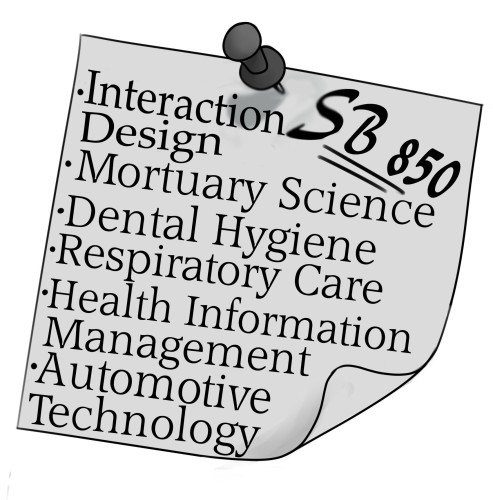SB 850 Paves Way for Community Colleges
SHELLEY LIN
FARRAH LUU
Staff Writers
Last fall, Governor Jerry Brown signed Senate Bill 850 (SB 850), adding California to the 21 other states that allow community colleges to offer bachelor’s degrees. SB 850 will start off as a pilot program that will end in 2023. The fifteen community colleges will provide students with the choice of a single bachelor’s degree not offered at any Universities of California (UC) or Cal State Universities (CSU), according to the Daily Californian.
Ten out of the fifteen community colleges that were approved to offer bachelor degrees that address the need for more jobs in the health field, like mortuary science, dental hygiene, respiratory care and health information management. These colleges include Modesto Junior College, Cypress College, Foothill College, Crafton Hills College, Feather River College, San Diego Mesa College, Santa Ana College, Shasta College, Skyline College and West Los Angeles College. The other five community colleges include Rio Hondo College, Antelope Valley College, Bakersfield College, Mira-Costa College and Santa Monica College will accommodate students who are looking
to major in automotive technology, airframe manufacturing, industrial automation, biomanufacturing and interaction design, respectively.
“It will benefit all students because it provides access to all students who may not be able to afford [college],” English teacher Shelley Gee-Ryan said.
According to the San Francisco Chronicle, each college’s upper division course that focus more on a major’s specific needs can cost $84 a unit by law. On or before March 31, 2015 the Board of Governors of the California Community Colleges will create a funding plan that will support the costs needed to accommodate the number of full-time students enrolled in each program, according to SB 850.
“The possibility for students to earn [their] bachelor’s degree at community colleges will benefit California because it offers a cheaper alternative and more options for students looking to obtain a higher level of education,” senior Matthew Chan said.
However, this bill does not follow California’s Master Plan for Higher Education, a plan that gave separate roles for California’s three higher-education systems, according to the San Francisco Chronicle. SB 850 diverges from the Master Plan by allowing community colleges to offer a bachelor degree rather than providing only two-year associate’s degrees, according to the San Francisco Chronicle.
“Although it is going to benefit many students who are striving the medical, science and technology fields, many opportunities will not be given in changing their major,” junior Kimberly Pham said.
According to SB 850, California needs an additional million baccalaureate degrees in California’s workforce to remain competitive in today’s economy. According to the Los Angeles Times, community college bachelor degrees will generate the needed degrees for California’s state workforce by 2025, especially in job fields related to health like medicine and dentistry.
“I think it will benefit students, primarily those who maybe were not on the path to a four year university. This will give more people the opportunity of a higher education,” sophomore Sara Castro said.
